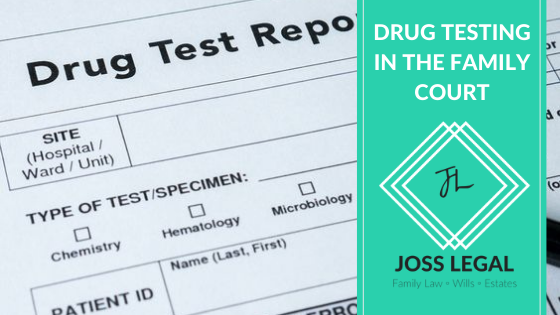In recent years, the Court has noted a significant rise in the number of parenting disputes where there are allegations that parents are exposing their children to harm by using illicit substances.
In relation to parenting matters it is of importance to the Family Court as substance use is directly relevant to the court’s responsibility to protect a child from harm. As a result of this, the Court has the power to order parties to the proceedings to undertake drug testing through independent test agencies. Often, these tests are ordered even when the alleged drug user disputes these allegations.
What is the process?
When there are allegations in relation to the use of illicit substances, an applicant typically requests orders to be made as soon as possible, also known as interim orders, for the respondent or all parties to undertake drug testing.
Parties can also request in orders that they undergo drug testing on a regular basis as evidence to the court that they are no longer using illicit substances.
In cases in which an Independent Children’s Lawyer (ICL) has been appointed they often hold the responsibility of requesting drug testing at random. This is typically made in writing and the parties that are requested to provide the testing have 24 hours to return the results to all parties and the court.
In the event where a party has been requested to take a drug test and refuse, the Family Court may draw an inference of a positive test if the party fails to provide legitimate reasoning for their failure to comply.
What kinds of drug tests are used?
It is up to the Court to decide which type of test is administered and it is done on a case by case basis depending usually on what type of drug the court is testing for.
The Court typically initially orders for a uranalysis (urine testing) as it is useful to test for drug use in the short time before the sample is taken. This option is quick and administered at relatively low cost.
Over recent years however the Courts have begun ordering hair follicle tests (testing of hair strands) more frequently as they provide sample evidence about a party’s drug use over 3 months’ and on occasion, 6 months’ time rather than simply indicating if a party has recently used drugs. Hair follicle tests also give a better indication of how frequent and what volume of a certain type of drugs a party is using.
In the case of alcohol abuse, the ICL may request a blood test which judges liver damage and function.
How much does it cost and who pays?
The cost of a drug test varies depending on which type is requested and also the centre at which it is administered. Please see below for examples of centres which administer drug testing.
- Western diagnostics centre: https://www.wdp.com.au/patients/find-a-collection-centre/
- Clinipath Centres: https://www.clinipathpathology.com.au/our-locations/
- Brassets Group: https://app.acuityscheduling.com/schedule.php?owner=17167148
Typically, the party undergoing the test covers the costs however this is not always the case.
My drug test has come back positive, what now?
A positive drug test result does not necessarily mean that a party will not be able to spend time with their children. In many cases, contact (sometimes supervised) can still occur if there is evidence of the party attempting to address their drug related issues.
Courts will often order for parties to attend specific counselling or rehabilitation services if they continue to seek time with their children before providing a clean drug result. There are many drug and alcohol related counselling services which assist parents with a history of drug use. See below for examples;
- Next Step Drug and Alcohol Services: https://www.mhc.wa.gov.au/about-us/our-services/next-step-drug-and-alcohol-services/
- Shalom House: https://www.shalomhouse.com.au/
Should you have any further questions regarding drug testing or wish to speak with one of our friendly team members about your matter please do not hesitate to contact our offices on (08) 6559 7480 or send us a Facebook Message.
Author: Kym Barrett-Lennard



